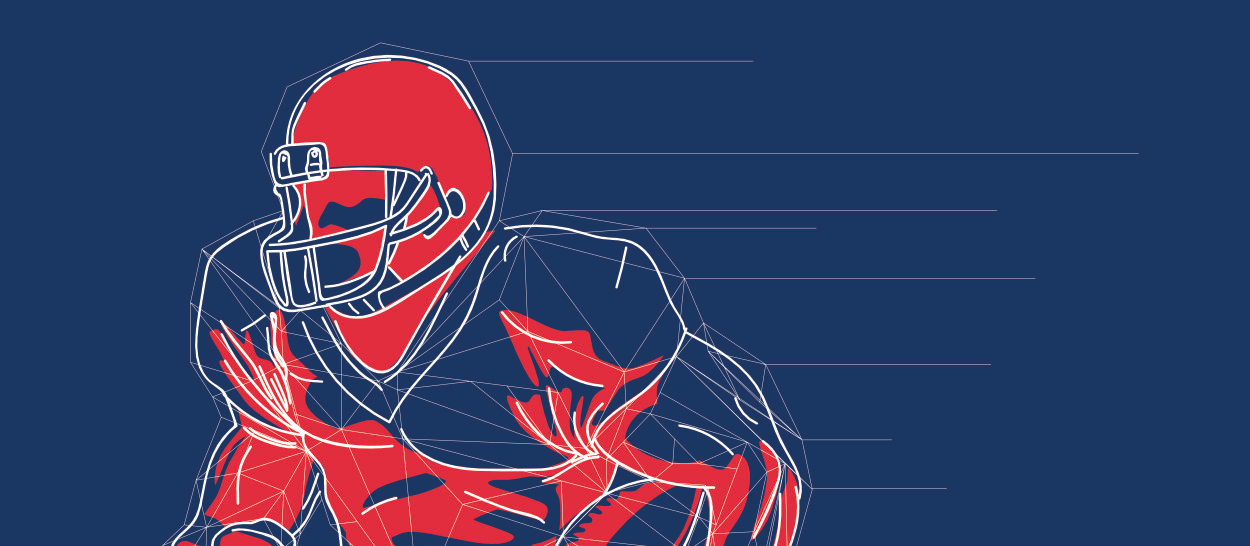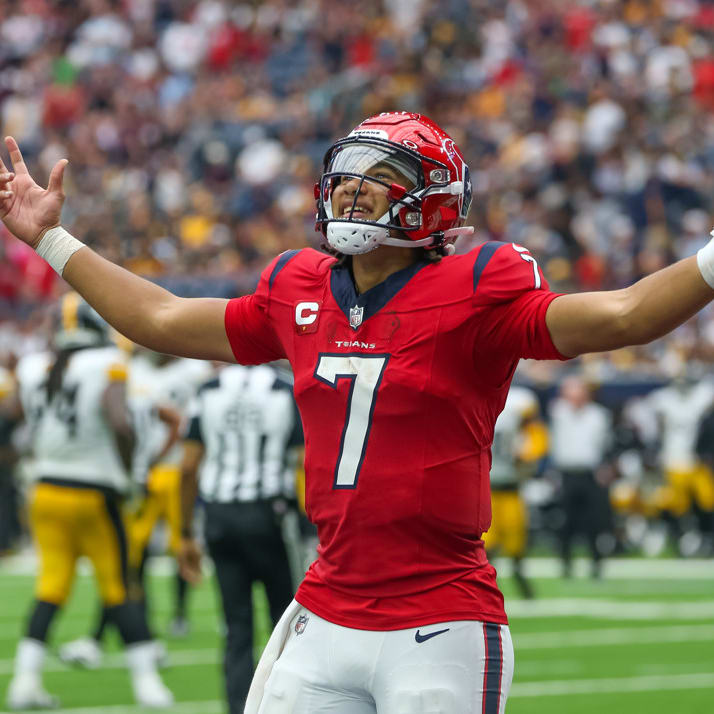This article is part of our According to the Data series.
Do players drop off after signing big contracts?
I like money. I write for a few different reasons, but if we're being honest, the strongest is probably that it helps me make money. And the more money I can make, the more incentivized I am to do a really good job.
I'm going to guess you also like money. And regardless of where we stand on the more complicated topic of how much money can increase our happiness, I don't think I'd be going out on too much of a limb in predicting that you're also motivated, at least in part, to make more money.
Well, football players are the same way. Even though they all make well above the median household income from the moment they enter the NFL, it's not like the majority of players are raking in millions and millions of dollars a year. So when they come into the NFL and get a little taste of that money, they presumably want more.
I've done some past analysis that suggests you shouldn't specifically target players in contract seasons. Quarterbacks, running backs, wide receivers and tight ends have all performed roughly the same (slightly worse as a whole, actually) in the season prior to becoming a free agent than they did in the two seasons before the contract year. There are outliers in both directions, of course, but overall, players don't play much better than normal in contract seasons.
I don't think that's necessarily evidence those players aren't
Do players drop off after signing big contracts?
I like money. I write for a few different reasons, but if we're being honest, the strongest is probably that it helps me make money. And the more money I can make, the more incentivized I am to do a really good job.
I'm going to guess you also like money. And regardless of where we stand on the more complicated topic of how much money can increase our happiness, I don't think I'd be going out on too much of a limb in predicting that you're also motivated, at least in part, to make more money.
Well, football players are the same way. Even though they all make well above the median household income from the moment they enter the NFL, it's not like the majority of players are raking in millions and millions of dollars a year. So when they come into the NFL and get a little taste of that money, they presumably want more.
I've done some past analysis that suggests you shouldn't specifically target players in contract seasons. Quarterbacks, running backs, wide receivers and tight ends have all performed roughly the same (slightly worse as a whole, actually) in the season prior to becoming a free agent than they did in the two seasons before the contract year. There are outliers in both directions, of course, but overall, players don't play much better than normal in contract seasons.
I don't think that's necessarily evidence those players aren't motivated to obtain a new contract, but just that the motivation isn't any higher in the year right before a new deal than in previous seasons. If you're a third-round draft pick, you're probably playing your ass off from the moment you enter the league so that you can stay there. With the average NFL career somewhere in the range of three years, young players know they have a limited window to cash in.
When the Motivation Stops
It's your lucky day. Your boss just praised you and your value to the company, so much that he's rewarding you with a five-year, $60 million contract extension. You never topped six figures in a year, so the jump in salary is literally never going to happen awesome.
With $12 million in the bank in the first year, are you going to be as motivated to perform as you were when you were struggling to get a promotion? Be honest with yourself. You might come out of the extension on fire to prove to your boss he made the right call, but eventually that motivation will dissipate.
Then you'll just be stuck there at a job you really don't like, wishing you could leave to go play with your millions of dollars, with zero motivation to help the company grow. Well, that's the position I'd be in, anyway. If I suddenly had $12 million in the bank, I can promise you the quality of my writing would deteriorate in a hurry.
Does that mean I don't take much pride in what I do? Yeah, maybe, I don't know. But that's what would happen, and I suspect the same lack of motivation would also strike a lot of young NFL players. Anecdotally, I've always thought that certain types of players - the ones who are motivated to play more for monetary gains than to truly improve their craft - rarely seem to provide their teams with a return on their investment.
But I didn't know for sure, so I ran some numbers.
The Numbers on the Post-Contract Downfall
To test this theory, I researched the current largest contracts in terms of guaranteed money. I sorted them by position, analyzing just over five dozen players in total. I charted their average fantasy rank (at their position) in the two years prior to their massive contract extensions versus (when applicable) their average fantasy rank in the two years afterward.
Quarterbacks
Here are the quarterbacks I studied. The smaller the bar, the better the ranking.
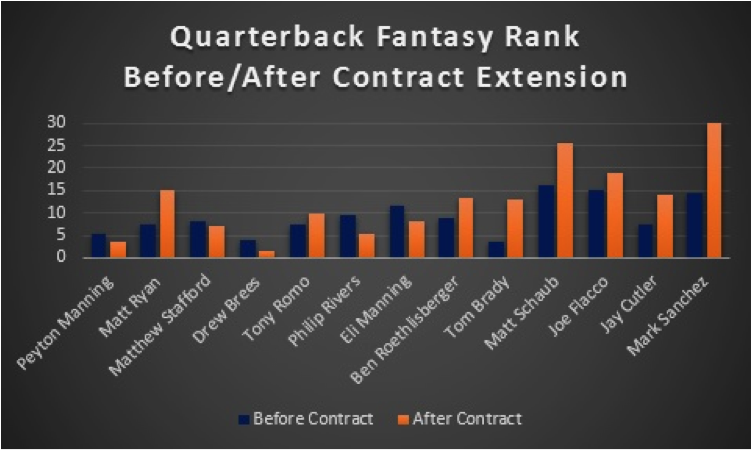
The biggest drop in play came from Mark Sanchez, though he should have never been given a contract extension in the first place. Overall, there certainly appears to be an effect here.
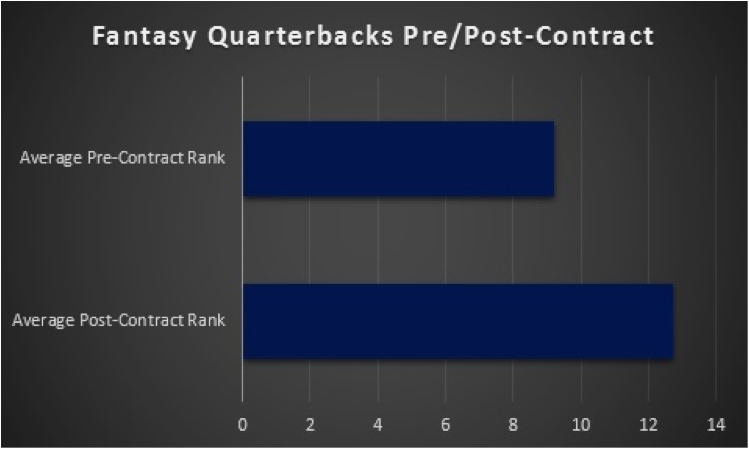
Of the quarterbacks I analyzed, the average drop in fantasy rank was 3.5 spots. While that might seem insignificant, it's actually 38.0 percent of their pre-contract rank.
Running Backs
If I were an NFL GM, I don't think I would ever give a running back a contract extension. Running backs are so dependent on the offensive line for production and possess such a sad-looking career trajectory - I've shown that running backs enter the NFL at peak efficiency and slowly decline from there - it just doesn't make sense to pay them.
But some teams do just that. Because what could go wrong when you forgo science/math in favor of dogma? Nothing, nothing at all.
So what happens when running backs get huge contracts with lots of guaranteed money?
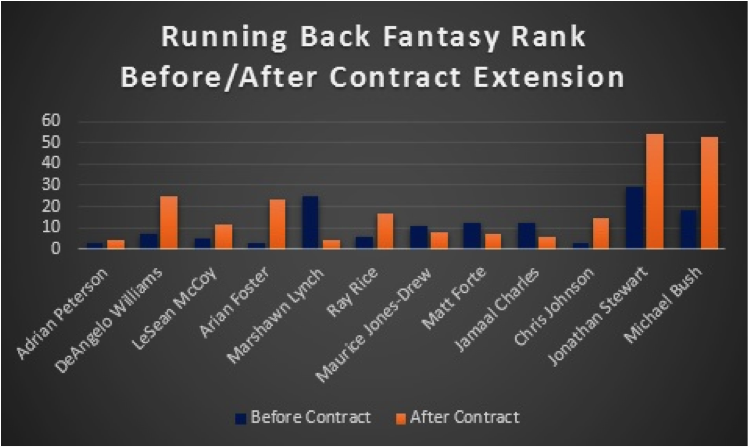
At the top of the guaranteed money spectrum, we see a few backs who have really failed to live up to expectations in DeAngelo Williams and Arian Foster. Even the backs near the lower end - Jonathan Stewart and Michael Bush among them - have failed to live up to their deals.
If there's one contract on this list that made sense, however, it was that for Jamaal Charles. When he signed an extension with the Chiefs in 2010, Charles was still just 24 years old. He was coming off of a decent-but-not-spectacular season in which he ran for 1,120 yards, hauled in 40 catches for 297 yards, and scored eight total touchdowns.
At the time, though, Kansas City saw enough of Charles, who displayed all of the predictors of success for running backs - youth, speed, pass-catching ability, and rushing efficiency. The Chiefs got an absolute steal on Charles with a six-year, $28 million deal. Imagine if they waited a year, after which Charles rushed for nearly 1,500 yards and unbelievably averaged 6.4 YPC.
Charles is an exception. Overall, the results haven't been pretty for running backs after signing big deals.
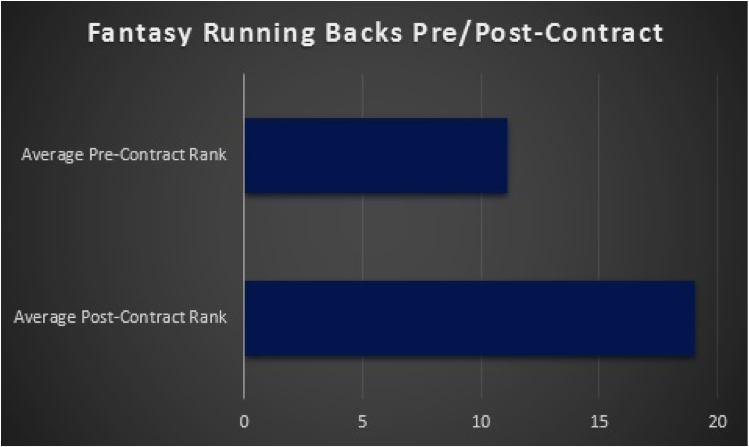
The running backs I studied finished with an average rank of 11.1 in the seasons before their contract extensions, but only 19.0 following the deals. That's a drop of 71.2 percent.
Wide Receivers
When I decided to do this analysis, it was because of a handful of players who I could recall signing hefty contracts, then proceeding to apparently pack it in. I didn't really think about it at the time, but all of those players - Larry Fitzgerald, Mike Wallace, Marques Colston, Miles Austin and Victor Cruz, among others - were wide receivers.
It could just be variance, of course, but the data sure does seem to point to wide receivers playing much, much worse post-contract.
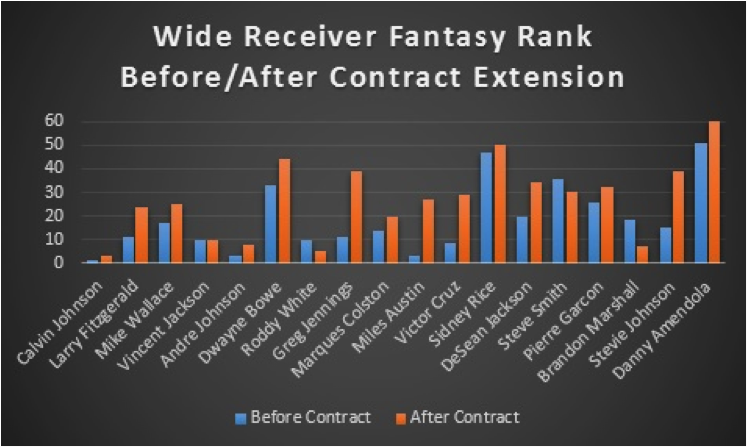
You can see quite a few "after contract" bars extend above those for "before contract," meaning the top-paid wide receivers haven't done much as a group to live up to their deals. Brandon Marshall made the largest improvement, jumping from an average rank of 18.5 to 7.5, but part of that was probably due to being re-united with Jay Cutler in Chicago.
Take a look at the overall drop. Note that I removed Calvin Johnson from this set of data because he had an average fantasy rank of 1.0 in the two years prior to his big contract extension, i.e. there was no room for improvement. I'll discuss that idea in a bit.
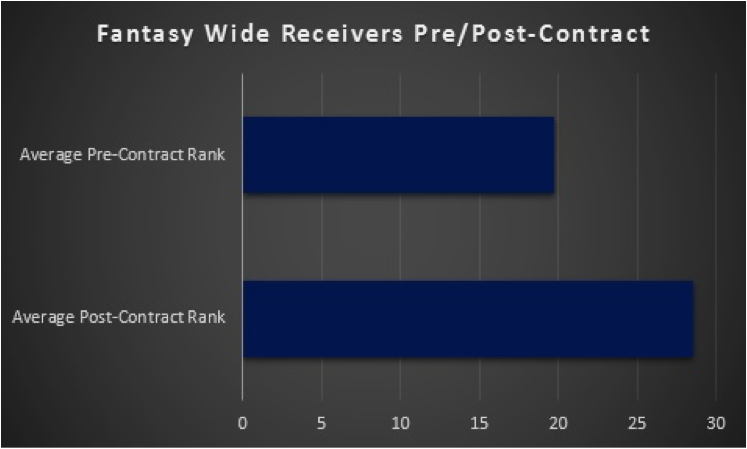
The group of wide receivers dropped from an average rank of 19.7 all the way down to 28.5. That's a 47.1 percent decline.
Tight Ends
When I performed the study on players in contract years, tight end was the only position to actually see an increase in production over prior seasons (albeit a very modest one). I wrote it off as variance.
Now, I've found that though the tight ends as a whole see their fantasy rank drop after signing a big deal, it's the smallest effect of any position. Here are the individual tight ends I charted.
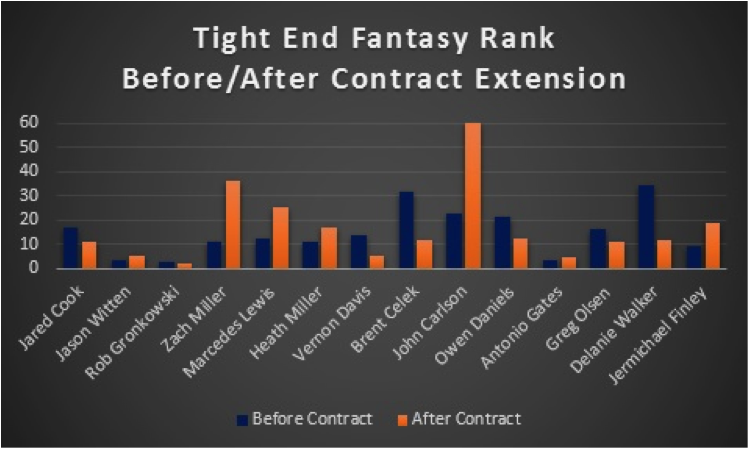
And overall...
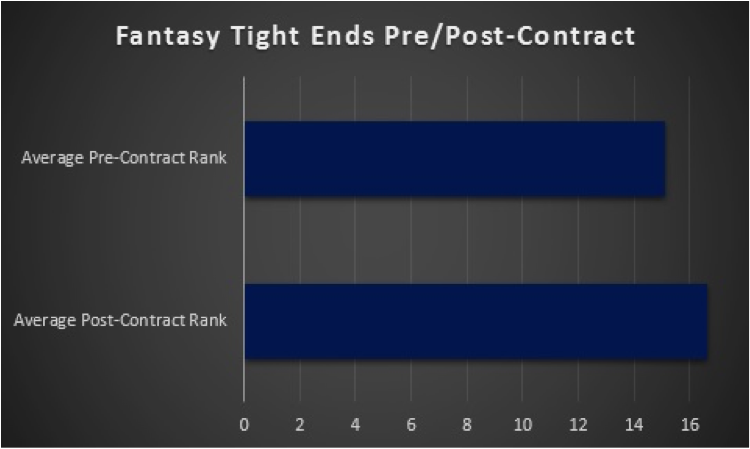
The typical tight end dropped 1.5 spots after signing a new contract, constituting just a 9.9 percent decline from his pre-contract rank.
Combining all positions, the average pre-contract rank was 14.0 and the mean post-contract rank was 19.5. So if you were asked to predict the final fantasy rank of a random, unknown player who just signed a new deal, your best bet would be to go with around five to six spots lower than his average rank in the prior two seasons.
Failure Rates By Position
I used average ranks to give you an idea of how far players at each position have fallen post-contract, but an even better way to analyze them might just be to do a simple tally: what percentage of players at each position have dropped after receiving an extension?
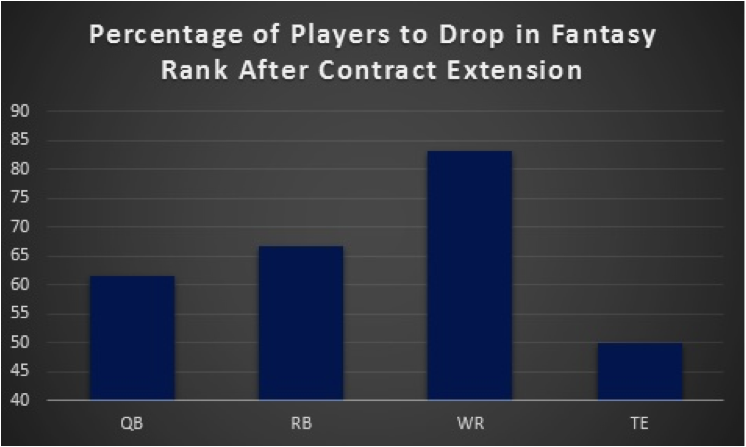
Analyzing each position in this manner, post-contract wide receiver decline is especially apparent. It's significant when you consider the average pre-contract rank for all wide receivers (including Calvin Johnson) was 18.6.
So why is this the case? Could it just be randomness?
Perhaps, but my guess is, at least for quarterbacks, the type of mentality that would lead to dominance at the position (at any point) would be one that could result in more sustainable success than that for wide receivers or running backs.
It's not that running backs and wide receivers don't need to be committed to improving their games, but just that playing quarterback so clearly requires such an incredible combination of skill, determination, and preparedness - more so than at any other position, by far - you just won't see the same lack of consistency as you might at wide receiver.
Put differently, wide receivers can get lucky, happening upon a breakout campaign perhaps without an elite work ethic. I don't think that's the case at quarterback - the players who break out necessarily need to put in the time - and that approach lends itself better to 1) a lower bust rate and 2) more sustainable success.
And as for tight ends, well, I just don't know.
The Limitations
I want to briefly address the limitations of this analysis, of which there are at least a couple. The main one is that players who sign contract extensions are generally outliers; the reason they got a new deal is (usually) because they performed better than average.
Because of that, we'd expect players coming off of contract extensions to perform a little bit worse than they did previously no matter what. Coming off of an outlying season, their play would typically regress toward the mean regardless of their level of motivation.
There's also a limit on how highly a player can rank, while no such limit exists for downside. The reason I removed Calvin Johnson from the sample is because he couldn't possibly improve upon his first place average. I limited the impact of that effect by showing the probability of a player dropping at each position post-contract, but it's still an issue.
The final problem is there aren't necessarily great parameters to know when we should expect a player to buck the trend and continue to perform at a high level even after signing a big fat deal. I broke the numbers down by position, but there's more work to be done there. Perhaps wide receivers of a certain age typically continue to perform well if they're seeking yet another deal in the future, for example.
Conclusions
However, I still think the data is actionable (even if it's only as a tiebreaker between two players). While the average fantasy ranks of the players before their extensions are outliers, it's not like they're incapable of being overcome. I don't think the outlier theory is enough to make up for the incredible decline we see with post-contract wide receivers, for example. There really does appear to be a meaningful effect.
And even if we can't know for sure if a particular player will play at a high level, we never know that. All we can do is play the percentages, and the numbers say to avoid players who just signed big contract extensions if a comparable non-extension player is available.
Further, you can perhaps improve upon your ability to predict a decline in production by pairing the data with rumblings you hear about a player. When you see a new deal handed out to Player X who just had a single breakout season and is rumored to have a poor work ethic, it's a different situation from someone like Larry Fitzgerald, for example, who we pretty much know works his tail off.
Jonathan Bales is the author of the Fantasy Football for Smart People book series. He also runs the "Running the Numbers" blog at DallasCowboys.com and writes for the New York Times.

